Grafting methods
by Wally Ganmor, hibiscusworld.com
Side
Graft
At one time the side-veneer graft was a popular technique for grafting
varieties of camellias and rhododendrons that are difficult to root.
Currently, it is the most popular way to graft conifers, especially
those having a compact or dwarf form. Side-veneer grafting is usually
done on potted rootstock. 2
This is the easiest technique for many. For a rooted cutting, it is
necessary to pull upwards with the left hand while applying downward
pressure with the cutting blade at the right angle. Otherwise the
pressure will break the roots off.
Make sure the angle stays constant with only a firm pressure
Use a rocking forward-back motion, not a hard shove
Try not to "scoop" - no curved cuts!
Try to cut the scion with a "flat" cut without scooping
Practice on scrap cuttings for you will need lots of practice
Un-rooted cuttings from pencil to finger thickness will do
Remember, tough tape can pull "soft" wood in to close gaps!!!
Here is a picture sequence which may help give the idea. 1
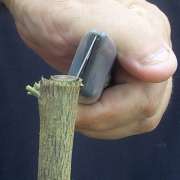
Practice the angle |
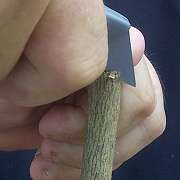
Now apply pressure |
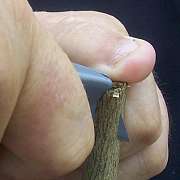
Rock forward |
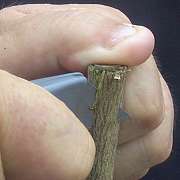
Then back |
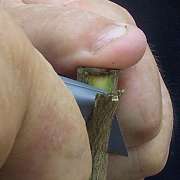
Forward again |
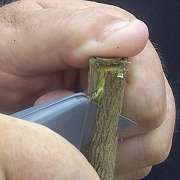
Back again |
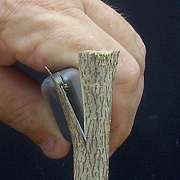
Test the cut depth |
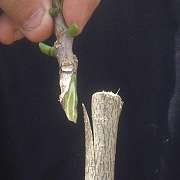
Insert the scion |
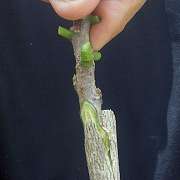
Down she goes! |
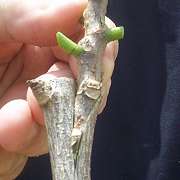
The fit's OK |
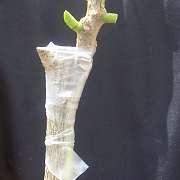
It's a wrap!! |
|
Sequence side graft
Preparing the
Stock: Rootstock is grown in pots the season before
grafting, allowed to go dormant, and then stored as with other
container nursery stock. After exposure to cold weather for at least
six weeks, the rootstock is brought into a cool greenhouse for a few
days before grafting takes place to encourage renewed root growth. The
plant should not be watered at this time.
Make a shallow downward cut about 3/4 inch to 1 inch long at the base
of the stem on the potted rootstock to expose a flap of bark with some
wood still attached. Make an inward cut at the base so that the flap of
bark and wood can be removed from the rootstock. Preparing the Scion:
Choose a scion with a diameter the same as or
slightly smaller than the
rootstock. Make a sloping cut 3/4 to 1 inch long at the base of the
scion. Inserting the
Scion: Insert the cut surface of the scion against
the cut surface of the rootstock. Be certain that the cambia contact
each other. Securing the
Graft: Hold the scion in place using a rubber
grafting strip, tape, or grafting twine. Seal the entire graft area
with warm grafting wax or grafting paint. Remove the rubber or twine
shortly after the union has healed. Never allow the binding material to
girdle the stem. 2
Back to
Grafting
Techiques Page
|
|










